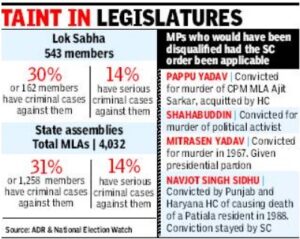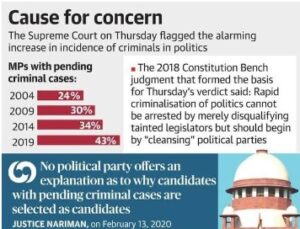Criminalisation of Politics
Relevance
- GS 2: Salient Features of the Representation of People’s Act.
- Tags: #ADRReport2023 #IndianPolitics #ElectoralReform #UPSC #CurrentAffairs.
Why in the News?
A recent report by the Association of Democratic Reforms (ADR) and New Election Watch (NEW) reveals alarming statistics about criminal cases among India’s sitting Members of Parliament (MPs).
Alarming Stats on Criminal Cases Among Indian MPs
A recent report by the Association of Democratic Reforms (ADR) and New Election Watch (NEW) reveals-
- 40% of the current Members of Parliament (MPs) in India have been accused of criminal cases.
- Shockingly, 25% of these lawmakers face serious charges such as murder, attempt to murder, kidnapping, and crimes against women.
- This report, titled “Analysis of Sitting MPs from Lok Sabha and Rajya Sabha of India 2023,” studied 763 sitting MPs from a total of 776 seats in the Lok Sabha and Rajya Sabha.
- These findings were released on September 12, highlighting significant concerns about the criminal backgrounds of elected officials in India.
- In the Lok Sabha, four seats are vacant, and one in the Rajya Sabha is empty.
- Also, four Rajya Sabha seats in Jammu and Kashmir are undefined.
- Shockingly, 40% of the sitting MPs analyzed, which is 306 out of 763, have declared criminal cases against themselves.
- These cases include serious charges like murder, attempt to murder, kidnapping, and crimes against women.
- Lakshadweep has the highest proportion of MPs with criminal cases, with its lone MP having such charges.
These percentages represent the proportion of MPs from each state or union territory who have declared criminal cases against themselves in their affidavits.
| State/UT | Percentage of MPs with Criminal Cases |
| Kerala | 79% |
| Bihar | 73% |
| Maharashtra | 57% |
| Telangana | 54% |
| Delhi | 50% |
One-Quarter of Indian MPs Face Serious Criminal Charges
- Out of the 763 sitting MPs analyzed, a concerning 25% (194 MPs) face serious criminalcharges, including offenses like murder, attempt to murder, crimes against women, and kidnapping.
- Remarkably, Lakshadweep stands out with 100% of its MPs having serious criminal cases against them.
Percentages depict MPs facing serious criminal charges in various states/UTs
| State/UT | Percentage of MPs with Serious Criminal Cases |
| Lakshadweep | 100% |
| Bihar | 50% |
| Telangana | 38% |
| Kerala | 34% |
| Maharashtra | 34% |
| Uttar Pradesh | 34% |
Percentages show MPs with criminal cases by political party, per ADR-NEW
| Political Party | Percentage of MPs with Criminal Cases |
| Rashtriya Janata Dal (RJD) | 83% |
| Communist Party of India (Marxist) (CPI(M)) | 75% |
| Congress | 53% |
| YSR Congress Party (YSCRP) | 42% |
| Trinamool Congress (AITC) | 39% |
| Nationalist Congress Party (NCP) | 38% |
| Bharatiya Janata Party (BJP) | 36% |
| Aam Aadmi Party (AAP) | 27% |
Disturbing Findings: Sitting MPs in India with Serious Criminal Cases
Serious criminal cases among sitting Members of Parliament (MPs) in India encompass various offenses. These include:
- Offenses with a maximum punishment of five years or more.
- Non-bailable offenses.
- Electoral offenses like bribery.
- Offenses related to financial loss to the exchequer.
- Crimes such as assault, murder, kidnapping, or rape-related.
- Offenses mentioned in the Representation of the People Act (Section 8).
- Offenses under the Prevention of Corruption Act.
- Crimes against women.
The report reveals that 11 sitting MPs have cases related to murder, 32 MPs have cases related to attempted murder, and 21 MPs have cases related to crimes against women. Shockingly, 4 MPs have declared cases related to rape. Among states, Uttar Pradesh has the highest number of MPs with murder and attempted murder cases.
MPs with Declared Cases Related to Murder by State
| State | Number of MPs with Murder Cases |
| Uttar Pradesh | 3 |
| Assam | 2 |
| West Bengal | 2 |
| Madhya Pradesh | 2 |
| Andhra Pradesh | 1 |
| Maharashtra | 1 |
MPs with Declared Cases of Attempt to Murder by State
| State | Number of MPs with Attempt to Murder Cases |
| Uttar Pradesh | 9 |
| West Bengal | 8 |
| Bihar | 4 |
| Maharashtra | 3 |
| Madhya Pradesh | 2 |
| Odisha | 2 |
| Andhra Pradesh | 1 |
| Telangana | 1 |
| Lakshadweep | 1 |
| Tamil Nadu | 1 |
MPs with Declared Cases Related to Crimes Against Women by State
| State | Number of MPs with Cases Related to Crimes Against Women |
| West Bengal | 5 |
| Kerala | 3 |
| Andhra Pradesh | 3 |
| Uttar Pradesh | 2 |
| Maharashtra | 2 |
| Telangana | 2 |
| Odisha | 2 |
| Rajasthan | 1 |
| Tamil Nadu | 1 |
MPs with Declared Cases of Rape by State
| State | Number of MPs with Rape Cases |
| Rajasthan | 1 |
| Kerala | 1 |
| Andhra Pradesh | 1 |
| West Bengal | 1 |
MPs with Cases Related to Murder, Attempt to Murder, and Crimes Against Women by Political Party
| Political Party | MPs with Murder Cases | MPs with Attempt to Murder Cases | MPs with Crimes Against Women Cases |
| BJP | 7 | 24 | 10 |
| Congress | – | – | 2 |
| YSRCP | – | – | 1 |
Causes of Criminalization of Politics
The criminalization of politics in India has been a long-standing concern and is attributed to various factors
Money power
- The use of money to influence elections and political decisions is a major cause of the criminalization of politics.
- This is because it allows criminals and other unscrupulous elements to buy their way into power.
- Example: In the recently concluded assembly elections in Uttar Pradesh, the Election Commission of India (ECI) seized a record amount of cash and other illegal materials from political parties and candidates.
- This shows the extent to which money power is being used to influence elections in India.
Weak law enforcement
- The lack of effective law enforcement against criminals and corrupt politicians is another major cause of the criminalization of politics.
- This is because it creates an environment where criminals can operate with impunity and use their ill-gotten wealth to influence politics.
- Example: The recent case of the murder of a young woman in Hathras, Uttar Pradesh, is a grim reminder of the failure of law enforcement in India.
- The accused in the case, who are all powerful members of the ruling party, have been able to evade arrest and prosecution for months.
Flawed electoral system
- The current electoral system in India is also conducive to the criminalization of politics.
- This is because it is based on a first-past-the-post (FPTP) system, which rewards candidates who win a plurality of votes, even if they do not win a majority.
- This can lead to the election of candidates who have criminal records or who are backed by criminals.
- Example: In the 2019 Lok Sabha elections, several candidates with criminal records were elected to Parliament.
- This includes Anant Kumar Hegde, who has been accused of hate speech and inciting violence, and Navjot Singh Sidhu, who has been accused of road rage.
Role of media
- The media can also play a role in the criminalization of politics by giving undue coverage to criminals and corrupt politicians.
- This can create a perception that these individuals are powerful and influential, and can make it more difficult to hold them accountable for their actions.
- Example: In recent years, there has been a proliferation of news channels that are owned or controlled by politicians or their proxies.
- These channels often give favorable coverage to their owners and allies, while ignoring or downplaying their misdeeds.
Weak Screening Mechanisms
- Political parties often fail to implement effective screening mechanisms for candidate selection, allowing individuals with criminal backgrounds to enter politics.
- Example: In the 2020 Bihar Assembly elections, multiple political parties nominated candidates with criminal cases pending against them.
Electoral Compulsions
- Some political parties believe that candidates with criminal records have a better chance of winning elections due to their influence and resources.
- Example: In the 2019 Lok Sabha elections, the BJP fielded candidates with criminal cases, citing electability as a reason.
Lack of Public Awareness
- Many voters are unaware of the criminal records of their candidates, and this lack of information can lead to the election of individuals with tainted backgrounds.
- Example: In several state elections, voters have elected candidates without fully knowing their criminal histories.
Legal Loopholes
- The slow pace of India’s legal system allows politicians with criminal cases to remain in power for years without facing convictions or disqualifications.
- ExamplePoliticians like Lalu Prasad Yadav and Jayalalithaa were able to hold public office for extended periods despite facing criminal cases.
Vote Bank Politics
- Parties may overlook criminal backgrounds if they believe the candidates can secure votes from specific communities or regions.
Notable judicial cases related to the criminalization of politics in India
- Lily Thomas v. Union of India (2013): In this case, the Supreme Court of India ruled that convicted MPs and MLAs should be disqualified from holding office immediately. This landmark judgment aimed to curb the influence of politicians with criminal records in the legislative bodies.
- Public Interest Foundation v. Union of India (2018): The Supreme Court directed political parties to publicize the criminal records of their candidates, including details of pending cases, to raise transparency levels and empower voters to make informed choices.
- Ramesh Dalal v. Union of India (2005): The Supreme Court reiterated that candidates contesting elections must disclose their criminal records, including pending cases, to the Election Commission. This decision aimed to enhance transparency in the electoral process.
- Sampath Kumar v. Union of India (2005): The Supreme Court ruled that candidates contesting elections must declare their assets and criminal antecedents in affidavits. This judgment aimed to provide voters with critical information about candidates.
- Association for Democratic Reforms (ADR) v. Union of India (2002): The Supreme Court ruled in favor of ADR, an NGO advocating for electoral transparency, allowing it to access and publish criminal records and financial details of candidates and politicians.
- Gangaram v. Union of India (2005) The Supreme Court held that individuals disqualified from contesting elections due to criminal convictions should remain disqualified for the entire period of their sentence, including any subsequent remissions.
- People’s Union for Civil Liberties (PUCL) v. Union of India (2003): The Supreme Court directed the Election Commission to include the disclosure of assets, liabilities, and educational qualifications in candidates’ affidavits, enhancing transparency in the electoral process.
To address the concerning prevalence of criminal cases among sitting MPs, India must prioritize electoral reforms, enhance transparency, and promote ethical governance. Citizens should demand accountability, and political parties should strive to field candidates with clean records to strengthen democracy and uphold the rule of law.
Source:The Wire
Mains Question
Examine the role of political parties in fielding candidates with criminal backgrounds, as revealed in the ADR report. How can political parties be held accountable for the selection of candidates with criminal records, and what reforms could be introduced to promote cleaner politics in India?





